Headache All Over Or In A Band Around The Head
Table of Contents
- How People Describe This Pain Pattern
- How You Activate and Intensify This Pain Pattern
- Self-Care – Getting Relief on Your Own
- Musculoskeletal Anatomy Behind Your Pain
- Therapy Notes for Massage and Bodywork
How People Describe This Pain Pattern


“Migraine”
When this headache is very active, people wave their hands around their heads and say that they have a headache all over. Sometimes, when I ask, the details tell me that it is not all over. Instead, they are overwhelmed and it feels more like a band around the side of the head. But, when it is particularly intense, people refer to this as a migraine. If they can’t get specific, I ask them how it started or when it is the worst.
Band Around the Side
Sometimes, when this headache is less intense, people trace a band of tension around their heads. When it is on one side, they will explain the tension over their ear and later talk about how it extends to the eye or back of the head. People seldom connect it to the spot at the base of their heads.
How You Activate and Intensify This Pain Pattern
Like the headache on the top of your head, tilting movements create this headache. These activities might include painting the molding or watching a high screen at a bar.
Rocking the head with lots of little repetition aggravates this condition. For instance, you might be discussing a long wine list while using reading glasses.
Cold-Pressed
Sometimes this headache is created by stretching your head forward, especially when pushed into a hard or cold surface right there at the base of your head. However, this is more likely to create a headache on top of the head or a headache on the forehead.
The Common Cause
This posture is one of the most common causes of headaches that I see in my office. When you jut your chin forward to work on the computer, watch a game, lean in to listen, or rest your head in your hands, these muscles will tighten. People often hold this position for long periods, allowing the upper cervical joints to become displaced and fixated. Once that happens, this headache becomes more stubborn.
Sleep
Sometimes, people complain that they “slept funny.” I’ve had this from an awkward sleeping position on a plane or in a car. A cold draft or indigestion seem to make this worse.
The Musculoskeletal Anatomy Behind Your Pain
Clinically Proven
Self-Care Strategies
This post has strategies for getting relief on your own. Explore how to change your activities, stretch, and other strategies that relieve the pain associated with this trigger point.
Musculoskeletal Anatomy
These muscles strap the head onto the upper neck and fine-tune movements. This post has more about the anatomy of suboccipital muscles.
Getting Relief on Your Own
Therapy Notes for Massage and Bodywork
Better Bodywork
Through Shared Expertise
This post has techniques, tips, treatment routines, and anatomy illustrations to improve the bodyworker’s approach.
Support Integrative Works to
stay independent
and produce great content.
You can subscribe to our community on Patreon. You will get links to free content and access to exclusive content not seen on this site. In addition, we will be posting anatomy illustrations, treatment notes, and sections from our manuals not found on this site. Thank you so much for being so supportive.
Cranio Cradle Cup
This mug has classic, colorful illustrations of the craniosacral system and vault hold #3. It makes a great gift and conversation piece.
Tony Preston has a practice in Atlanta, Georgia, where he sees clients. He has written materials and instructed classes since the mid-90s. This includes anatomy, trigger points, cranial, and neuromuscular.
Question? Comment? Typo?
integrativeworks@gmail.com
Follow us on Instagram
*This site is undergoing significant changes. We are reformatting and expanding the posts to make them easier to read. The result will also be more accessible and include more patterns with better self-care. Meanwhile, there may be formatting, content presentation, and readability inconsistencies. Until we get older posts updated, please excuse our mess.